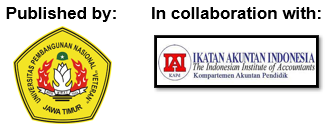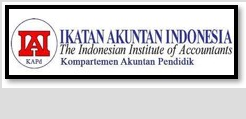Does Ethical Context Affect the Ethically Related Judgment by the Observers of Earnings Management?
DOI:
https://doi.org/10.33005/jasf.v2i2.51Keywords:
Ethical Context, Ethically Related Judgment, Earnings ManagementAbstract
This research aims to empirically prove that there will be a difference in ethically related judgment by the observer of earnings management, primarily when they work in the company, which has a higher ethical context or value, and they know the moral agent personally. This research used experiment 2x2 between subjects to collect data by giving each respondent different treatments and scenarios. The different treatments to the respondents are the diverse workplaces with different ethical values and whether the respondents were related to the moral agent. The sample for this research is the students of Musi Charitas Catholic University from both accounting and management majors who have been taking specific courses, e.g., Business Ethics, Business and Management, and Management Control System, so that they can figure out the organizational structure and how earnings management happen. The final sample for this research is 67 respondents from both majors. The result of this research proves that there is no different ethically related judgment from each observer in each scenario, whether they come from the company with the high or low ethical context or whether they know the moral agent personally or not. The results indicate that ethical judgment is more affected by the ethical value from each person rather than organizational culture or egocentric bias.
Downloads
References
Bruns Jr., W.J., K.A. Merchant, (1990). The Dangerous Morality of Managing Earnings. Management Accounting 72(2), pp 22-25.
Elias, R.Z. (2004). The Impact of Corporate Ethical Values on Perceptions of Earnings Management. Managerial Auditing Journal 19(1), pp 84-98.
Epley, N., dan E.M. Coruso, (2004). Egocentric Ethics. Social Justice Research 17(2): 171-187.
Healy, P.M., dan J.M. Wahlen, (1999). A Review of the Earnings Management Literature and Its Implication for Standard Setting. Accounting Horizon 13; pp 365-383.
Hunt, S.D, V.R. Wood, dan L.B. Chonko, (1989). Ethical Values and Organizational Commitment in Marketing. Journal of Marketing 53(3): 79-90.
Kaplan, S.E. (2001a). Further Evidence on the Ethics of Managing Earnings: An Examination of the Ethically Related Judgements of Shareholder and Non-Shareholder. Journal of Accounting and Public Policy 20, pp 27-44.
Kaplan, S.E. (2001b). Ethically Related Judgements by Observer of Earnings Management.Journal of Business Ethics 32(4), pp 285-298.
Lasdi, L. (2012). Studi Eksperimen Evaluasi Etis Manajer Terhadap Manajemen Laba dan Konsekuensinya. Jurnal Simposium Nasional Akuntansi XV, pp 1-26.
McMahon, J. M. & Harvey, R.J. (2007). The Effect of Moral Intensity on Ethical Judgment, Journal of Business Ethics, 72, 335-357.
Merchant, K.A., dan J. Rockness, (1994). The Ethics of Managing Earnings: an Empirical Investigation. Journal of Accounting and Public Policy 13, pp 79-94.
Nazaruddin. I. (2012). Pengaruh Religiositas, Relativisme Dan Idealisme Terhadap Penalaran Moral Dan Perilaku Manajemen Laba. Jurnal Akuntansi Dan Auditing Indonesia 16(1): 14-32.
Roychowdury, S. (2006). Earnings Management Through Real Activities Manipulation. Journal of Accounting and Economics 42, pp 335-370.
Rusdianto. (2018). Pengaruh Kinerja Ekonomi, Non Ekonomi, Dan Nilai Personal Dalam Proses Pengambilan Keputusan Manajer. Jurnal Balance 15(2): 12-34.
Septiari, D., dan M. Maruli. (2017). Earnings Management Behaviour: The Role of Pressure on Behaviour Performance. Asian Journal of Business and Accounting 10(2): 137-163.
Shafer, W.E., dan Z.H. Wang, (2010). Effects of Ethical Context and Machiavellianism on Attitudes Toward Earnings Management in China. Managerial Auditing Journal 26(5): 372-392.
Singer, M.S., dan A.E. Singer, (1997). Observer Judgements about Moral Agents’ Ethical Decisions: The Role of Scope of Justice and Moral Intensity.Journal of Business Ethics 16(5): 473-484.
Tannady, H., dan W.K. Munardi, (2015). Pengamatan Waktu Pelayanan Operator Pintu Tol dengan Uji Hipotesis Analysis of Variance (ANOVA) (Studi Kasus: Gerbang Tol Ancol Timur, Jakarta Utara). Journal of Industrial Engineering & Management Systems 8(1): 26-54.
Wardani, D.W., dan D.K. Santi, (2018). Pengaruh Tax Planning, Ukuran Perusahaan, Corporate Social Responsibility (CSR) Terhadap Manajemen Laba.Jurnal Akuntansi 6(1):11-24.














